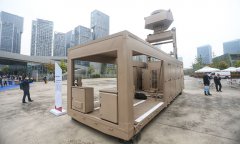Latest apps promise fast service but can they deliver?
Venture capitalists have poured billions into the latest pandemic delivery craze: companies that promise to get you a bottle of Tylenol, an iced coffee, hummus, a cucumber and a roll of paper towels
19 April 2022, 16:37
6 min read
Share to FacebookShare to TwitterEmail this articleA worker sets to make a delivery on a bicycle in front of Gorillas mini-warehouse in the Williamsburg section of the Brooklyn borough of New York on Monday, April 12, 2022. Gorillas is one of several companies that venture capitalists have poured billions into in the latest pandemic delivery craze.They typically deliver from mini-warehouses in residential and commercial neighborhoods. (AP Photo/Tali Arbel)
NEW YORK -- When Mahlet Berhanemeskel gets back to her New York City home from her 90-minute commute, she doesn’t feel like cooking. So instead she orders food like BLTs, Cheez-Its and cookies from an app called Gorillas. It's affordable and takes 10 minutes.
“It's instant gratification,” she said.
Gorillas is one of several companies that venture capitalists have poured billions into in the latest pandemic delivery craze: companies that promise to get you a bottle of Tylenol, an iced coffee, hummus, a cucumber or a roll of paper towels in 30 minutes — or even 15 minutes — or less. They typically deliver from mini-warehouses in residential and commercial neighborhoods.
Experts say they are unprofitable. Bigger companies are nonetheless muscling in. And officials in European cities and in New York, which has become the U.S. launching pad, have already started complaining about how they operate, saying it's bad for employees and residents.
“The problem I see is that quick commerce players, despite the huge valuations enjoyed and the seemingly unstoppable money flow that they get to grow, at some point they will have to find a path to profitability,” said Bain partner Marc-Andre Kamel, the co-author of a recent report on the online grocery market.
Services are already shutting down. One, 1520, closed in late December, and two more, Buyk and Fridge No More, shut down in March, apparently having run out of money. Buyk's Russian founders reportedly were not able to provide money due to restrictions put in place during the Ukraine war; it did not respond to questions. Fridge No More, in a tweet, said it was closing after two years “due to growing competition and other industry related issues.” Its founder did not answer questions.
Other delivery companies are having growing pains. Gorillas dropped its “10 minutes” delivery promise from its U.S. marketing — now it's just “in minutes.” Gopuff recently laid off 3% of its workforce — more than 400 people.
It's not a sustainable business model, says Len Sherman, an adjunct professor at Columbia University’s business school. “There is going to be a lot of consolidation on some very painful terms."
Getir, a Turkish company that operates in Europe as well as Boston, Chicago and New York, said the key to profitability is adding more mini-warehouses in the cities where it delivers.
“We're here for the long term,” said Langston Dugger, Getir's head of U.S. operations.
The company recently raised $768 million, valuing it at close to $12 billion, and plans to expand in the U.S. Customers range from people “ordering a late night ice cream to somebody who is doing a full grocery shop for the week for a family and everything in between," he said.
Lee Hnetinka, the founder of FastAF, a delivery company with a two-hour delivery model in New York, San Francisco and Los Angeles, said profitability is “just not a priority” right now as it invests in customer experience, saying their strategy is a long-term one and pointing to Amazon’s early beginnings when it too was unprofitable.
There are new competitive threats from established restaurant delivery companies DoorDash, Grubhub and Uber and grocery delivery service Instacart that have noticed the appeal of the fast-delivery apps.










